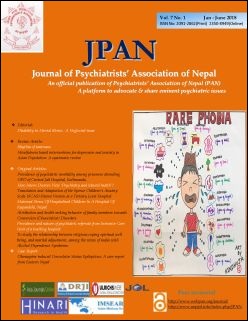Maternal Stress of Hospitalized Children in A Hospital of Rupandehi, Nepal
DOI:
https://doi.org/10.3126/jpan.v7i1.22937Keywords:
Maternal Stress, Hospitalized Children, NepalAbstract
Introduction: Illness and hospitalization are often critical events that a child is faced with and the stress of it can affect all family members. Maternal stress and anxiety can also affect the child in two ways, transferring stress to the child and interfering with the mother’s ability of childcare. Researcher sought to find out the maternal stressors of hospitalized children in a hospital of Nepal.
Material and Method: A descriptive cross-sectional study was conducted to find out the maternal stressors of hospitalized children among one hundred and five mothers selected through non probability purposive method. The data was collected by using semi-structured interview schedule and data was analyzed by using descriptive and inferential statistics with SPSS software version 16.
Results: The findings of the study revealed that more than half of the mothers 62.8%, 58.1%, 63.8%, 90.4%, 88.6%, 78%, 83.8% and 87.7% had very high stress related to child factors; child appears lethargic, weak and pale, prolongation of hospitalization, uncertain try about future of child’s medical condition, fear of relapse, child irritability and crying, in concern about IV fluids and tubes connected, child’s pain, and about laboratory and imaging respectively. Majority of mothers had stress related to social and economic aspects, 59% for failure to provide comfort to other children due to child illness, 82.8% had stress regarding being away from work and living place. Regarding stressors related to environmental factors, Majority 54.2% mothers had very high stress from equipments, 84.7% mothers had very high stress on unfamiliar environment, 68.5% had very high stress for lack of adequate sanitation and air pollution, 59% had very high stress that no room to rest for visitor. Regarding stressors related to hospital staffs, 78% mothers had very high stress for giving the responsibility for monitoring IV fluids, 74.2% had very high stress for turning over responsibility for collecting samples to mothers by nursing staffs, 60.9% mothers had very high stress on lack of attention from nursing staffs about mother’s problem and 68.5% had very high stress on lack of proper nutrition for hospitalized children.
Conclusion: Based on the study findings, it is concluded that mothers were passionate in taking care of their child. Most mothers had recognized that illness and hospitalization of their children had an overwhelming psychological and emotional impact on their own behavior and they did not have enough control over their reactions. Therefore, special attention should be given to identify the stressors in nursing care, planning and parents’ education, moving stressors and treatment in the same direction and the factors that can reduce the mother’s ability to provide childcare and delay in treatment progress.
Downloads
Downloads
Published
How to Cite
Issue
Section
License
This license enables reusers to distribute, remix, adapt, and build upon the material in any medium or format, so long as attribution is given to the creator. The license allows for commercial use.




